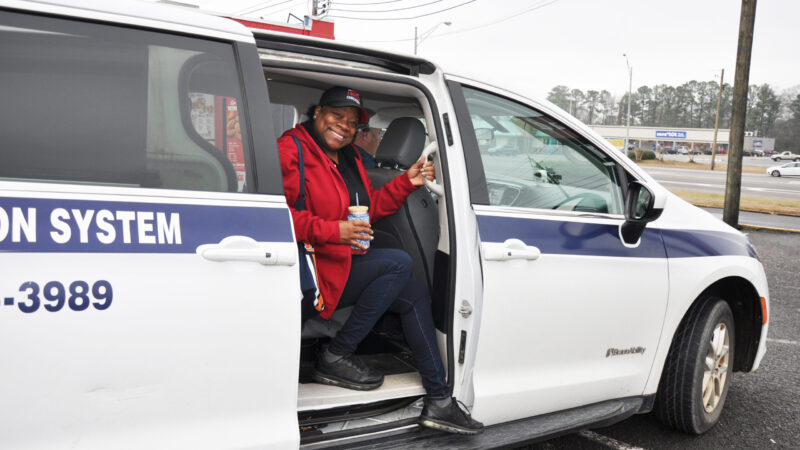New analysis casts doubt on ‘biosignatures’ found on planet K2-18b
Astronomers have been poring over last week’s claim of the detection of life-associated gases in the atmosphere of a distant planet named K2-18b — “the strongest evidence yet that life may exist on a planet outside our solar system,” as a University of Cambridge press release put it.
But already, one independent check suggests the announcement was overhyped.
Jake Taylor of the University of Oxford, who studies the atmospheres of far-away planets with the James Webb Space Telescope, did a quick reanalysis of the starlight filtering through K2-18b’s atmosphere. He used a simple method to look for the tell-tale signals of gas molecules of any kind.
He was “agnostic” in his approach, and did not look specifically for the exciting sulfur-based gases that, on Earth, are primarily associated with life-forms such as marine microbes.
“I wanted to not ‘assume’ what molecules would be in the atmosphere,” Taylor told NPR in an email. “I directly analysed the transmission spectrum that they analysed, in order to have a similar comparison.”
The results he got suggested that there’s too much noise in the data to draw any conclusions.
Rather than seeing a bump or a wiggle that indicated a signal, “the data is consistent with a flat line,” says Taylor, adding that more observations from the telescope are needed to know what can be reliably said about this planet’s atmosphere. “If we want to claim biosignatures, we need to be extremely sure.”
What this new work shows is that “the strength of the evidence depends on the nitty gritty details of how we interpret the data, and that doesn’t pass the bar for me for a convincing detection,” says Laura Kreidberg, an expert on the atmospheres of distant planets at the Max Planck Institute for Astronomy in Germany who didn’t work on the original research team or this new analysis.
She explains that astronomers can make a lot of different choices when analyzing data; for example, they can make different assumptions about the physics and chemistry at play.
“Ideally, for a robust detection, we want it to be model-independent,” she says — that is, they want the signal to show up even if the underlying assumptions change from one analysis to another.
But that wasn’t the case here.
The researchers whose claims made headlines, however, are not concerned about this re-look at their data.
In an email, Måns Holmberg, a researcher with the Space Telescope Science Institute and one of the authors of the original report, said that their analysis used a realistic atmospheric model “which provides higher significance,” and that the outcome of this new analysis “is not surprising given the simplicity of the model.”
And Nikku Madhusudhan of the University of Cambridge wrote that “there is nothing in this paper that worries me or seems relevant to the discussion about our result. I am only slightly surprised that the bar is so low for a rebuttal!”
Taylor, in contrast, thinks his work is plenty relevant.
“This test has been done in many publications looking at JWST observations, and has become a common ‘first look’ analysis,” he says, adding that it’s been previously used to detect water and carbon dioxide in other planets’ atmospheres. “It is definitely a powerful and useful methodology.”
This research note is likely to be the first of more to come, as astronomers have been busy kicking around the claims about K2-18b over discussion forums like Slack. What’s more, when astronomers do observations with the telescope, they typically get a year to privately study their collected data before it is made available to the public. That means the full dataset for these observations will become available on Saturday, April 26th. In the weeks ahead, more astronomers will have an opportunity to look it over and weigh in.
This first reanalysis is important “because it carries the frustrations expressed by many in the exoplanet community,” says Kevin Stevenson, at the Johns Hopkins University Applied Physics Laboratory, in an email to NPR.
In speaking with his colleagues about the claims made for a biosignature on K2-18b, he says, the “overwhelming consensus” is that the enthusiasm expressed in making the announcement far exceeded the strength of the evidence.
“Just like the boy that cried wolf, no one wants a series of false claims to further diminish society’s trust in scientists,” says Stevenson. “Context is important when it comes to science communication, particularly for a hot-button topic like the search for life beyond Earth, and we need to be responsible stewards in that respect.”
Surgeon general nominee Means questioned about vaccines, birth control and financial conflicts
During a confirmation hearing, senators asked Dr. Casey Means about her current positions and her past statements on a range of public health issues.
This novel about family drama is so good you may want to re-read it immediately
Allegra Goodman's new novel is called This Is Not About Us, but critic Maureen Corrigan says that title is coy: Readers are bound to see aspects of themselves and their families in these pages.
Actor Stellan Skarsgård doesn’t believe in bad guys
Skarsgård plays a filmmaker struggling to connect with his two grown daughters in Sentimental Value. As the father of eight, the Swedish actor says he understands the tension his character faces.
Kalshi reveals insider trading case against editor for MrBeast
With prediction markets booming, so have concerns about insider trading. Now, Kalshi has disclosed its first public actions against accounts suspected of trading on confidential information.
Greetings from Jordan’s Wadi Rum desert, where patches of green emerge after winter rains
Wadi Rum's otherworldly landscape is where Star Wars movies and The Martian were filmed. In late winter, plants emerge in this desert — but some are toxic to camels, so their herders must protect them.
Lack of transportation keeps many Alabamians from working. Rural public transit programs are trying to help
While lack of transportation is a major employment barrier in Alabama, few people take public transit to work. That dynamic is even more pronounced in rural areas.








